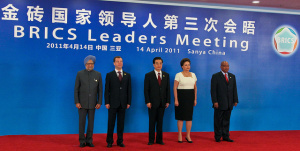What Happens to the Dollar When Iran Joins BRICS?

Iran Seeks to Join BRICS
According to the British International Business Times, Iran’s Deputy Economy Minister Behrouz Alishiri is seeking for Iran to join the BRICS alliance of emerging economies – Brazil, Russia, India, China, and South Africa. Alishiri made this announcement after meeting with his Brazilian counterpart at the annual meeting of the World Bank Group and the International Monetary Fund (IMF) in Washington. Their goal in joining BRICS would be to counteract the effect of US sanctions that are crippling Iran’s oil-based economy.
Suddenly Obama’s eagerness to dialogue with Hassan Rouani, Iran’s newly elected president, makes sense. The membership of oil-rich Iran in BRICS would strike another serious blow to the status of the petrodollar. In the 1970s the US dollar ceased to be backed by gold or silver. However, until recently the US government successfully maintained the value of the dollar through economic and military treaties requiring that oil be traded exclusively in dollars. This made it essential for all oil-importing countries to keep large amounts of US dollars in reserve. Thanks to BRICS, the US monopoly on oil trading is being steadily eroded – a major factor in the dollar’s decline relative to other currencies.
In 2011 the BRICS countries signed an agreement to use their own currencies, instead of dollars, in international trade. Then in March 2013 they announced plans to create their own bank to circumvent the World Bank and IMF.
The International Business Times reports that Iran already has close ties with Russia, China, Brazil, and India. Moreover the BRICS group has signaled their willingness to defy US sanctions related to Iran’s nuclear enrichment program.
During the latest BRICS summit in March 2013, the group voiced concern over Washington’s stance on Iran’s nuclear activities:
“We are concerned about threats of military action as well as unilateral sanctions, and hope that all outstanding issues relating to Iran ‘s nuclear programme will be resolved through discussions and diplomatic means. We believe there is no alternative to a negotiated solution to the Iranian nuclear issue, and recognize Iran ‘s right to peaceful uses of nuclear energy consistent with its international obligations.”
photo credit: Blog do Planalto via photopin cc


The Most Revolutionary Act
- Stuart Jeanne Bramhall's profile
- 11 followers



